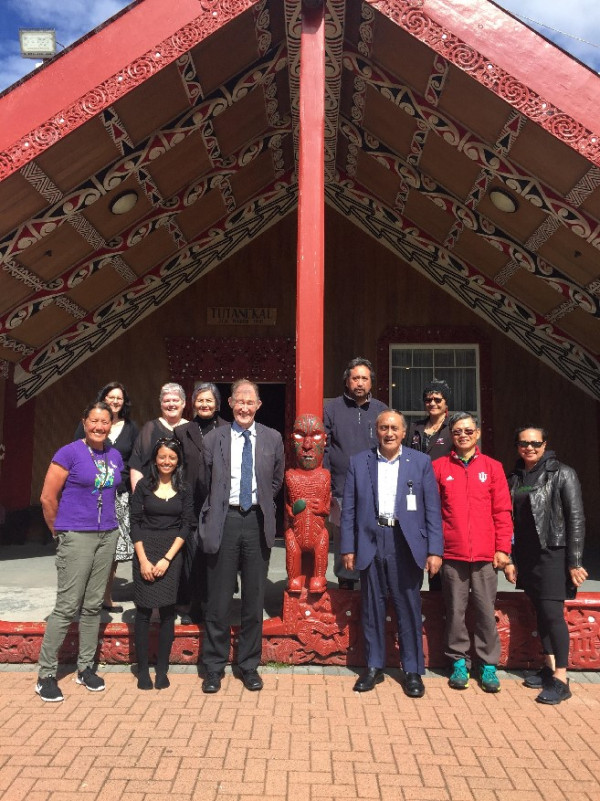Lung cancer
The Lung Cancer Research team works to improve early detection, treatment, and equity—partnering with communities to reduce the impact of lung cancer in Aotearoa New Zealand.
Overall lung cancer survival in NZ is poor especially for Māori. This is because lung cancer is typically diagnosed at a late stage once a patient has presented with symptoms. The reasons for late diagnosis can be due to both patient and health system factors. Both need to be addressed in order to improve survival.
Hā Ora – Improving early diagnosis of lung cancer for Māori and rural communities
This study was conducted over three years in the Midland Cancer Region which comprises Waikato, Lakes, Bay of Plenty and Tairawhiti DHBs and our research into the late diagnosis of lung cancer among Māori communities identified several barriers preventing Māori from accessing primary care.
Findings of the project highlight:
- Barriers in primary care, including symptom ambiguity, accumulating costs, barriers and enablers relating to GP – patient relationships.
- Barriers in secondary care, including a lack of access to diagnostic tests, long waiting times, barriers and enablers relating to communication between HCPs and patients
- The importance of whānau as carers and advocates for Māori patients on their lung cancer journey.
Our hypothesis is that a multi-pronged, community designed intervention will improve early detection and diagnosis for Māori with symptoms of lung cancer. Our aim was to understand the barriers to early diagnosis of Māori at risk of lung cancer.
Through a series of community-based co-design processes with four localities (Ōpōtiki, Gisborne, Rotorua and Te Kuiti), we designed and implemented interventions to improve early presentation and diagnosis of at risk Māori.
Download and read the final Hā Ora: Improving access to early diagnosis of lung cancer for Māori and rural communities report.
Co-designed interventions

The Hā Ora: Let’s talk lung health website (currently unavailable), to improve awareness of lung-related ailments and provide information on local community support services.
A Pou Pupuru Oranga/Cancer navigator, to provide support and advocate for whānau diagnosed with lung cancer, and to help them navigate the cancer care pathway.
A kaiawhina training programme, involving upskilling kaiawhina and clinical staff through a series of workshops discussing lung cancer symptoms, diagnostic and treatment pathways.
A series of lung cancer awareness videos, featuring a community-composed waiata encouraging whānau to go and see a doctor if they have a persistent cough
Project partners
This research was funded by the Health Research Council, and conducted in partnership with:
- Auckland University of Technology (AUT)
- Centre for Health
- Lakes District Health Board (DHB)
- Waikato DHB.
Special mention goes to our Māori health care partners:
- Te Puna Oranga
- Waikato DHB
- Whakatōhea Māori Trust Board in Opōtiki
- Turanga Health in Gisborne
- Ngāti Maniapoto Marae Pact Trust
- Maniapoto Whānau Ora Centre in Te Kuiti
- Aroha Mai Cancer Support Services
- Te Arawa Whānau Ora in Rotorua.
Recent publications
- Hā Ora: Reflecting on a Kaupapa Māori community engaged co-design approach to lung cancer research. Kidd, J., Cassim, S., Rolleston, A., Keenan, R., Lawrenson, R., Sheridan, N., Warbrick, I., Ngaheu, J. & Hokowhitu, B. (2021). International Journal of Indigenous Health, 16(2). DOI: doi.org/10.32799/ijih.v16i2.33106
- Indigenous perspectives on breaking bad news: Ethical considerations for healthcare providers. Cassim, S., Lawrenson, R., Keenan, R., Middleton, K., Rolleston, A.,…Kidd, J. (2021). Journal of Medical Ethics. DOI: doi.org/10.1136/medethics-2020-106916
- Hā Ora: Secondary care barriers and enablers to early diagnosis of lung cancer for Māori communities. Kidd, J., Cassim, S., Rolleston, A., Chepulis, L., Hokowhitu, B.,…. Lawrenson, R. (2021). BMC Cancer, 21. DOI: doi.org/10.1186/s12885-021-07862-0
- Hā Ora: Barriers and enablers to early diagnosis of lung cancer in primary healthcare for Māori communities. Cassim, S., Kidd, J., Rolleston, A., Keenan, R., Aitken, D.,..Lawrenson, R. (2020). European Journal of Cancer Care. DOI: 10.1111/ecc.13380
- Seeing the unseen: Evidence of Kaupapa Māori health interventions. Rolleston, A., Cassim, S., Kidd, J., Lawrenson, R., Keenan, R. & Hokowhitu, B. (2020). AlterNative. DOI: 10.1177/1177180120919166
- Management of patients with early stage lung cancer – why do some patients not receive treatment with curative intent? Lawrenson, R., Lao, C., Brown, L. et al. (2020). BMC Cancer, 20, 109. DOI: doi.org/10.1186/s12885-020-6580-6
- Co-opting or valuing the indigenous voice? A question of ethics. Kidd, J., Cassim, S., Rolleston, A. & Keenan, R. (2019). Ethnographic Edge 3(1). DOI: doi.org/10.15663/tee.v3i1.52
- Patient and carer perceived barriers to early presentation and diagnosis of lung cancer: A systematic review. Cassim, S., Chepulis, L., Keenan, R., Kidd, J., Firth, M. & Lawrenson, R. (2019). BMC Cancer 19(1), 25. DOI: 10.1186/s12885-018-5169-9.
- Characteristics of lung cancer patients receiving psychosocial support in urban New Zealand. Chepulis, L, Ryan, B, Blackmore, T, Burrett, V, McCleery, J, Lawrenson, R. (2019) Psycho-Oncology, 28, 1588-1590. DOI: doi.org/10.1002/pon.5137
- Characteristics of lung cancers and accuracy and completeness of registration in the New Zealand Cancer Registry. Lawrenson, R., Lao, C., Leonie, B., Wong, J., Middleton, K., Firth, M. & Aitken, D. (2018). NZMJ, 131(1479). PMID: 30048429